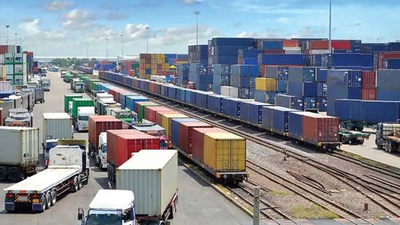
Armenia"s trade partners: Russia, China, Germany in focus. "
Russia is Armenia's primary trading partner and a major source of imports. As members of the Eurasian Economic Union (EAEU), Armenia benefits from preferential trade agreements with Russia. Armenia imports a significant amount of natural gas, petroleum products, machinery, vehicles, and various consumer goods from Russia. China has become an increasingly important trading partner for Armenia in recent years. Armenia imports a wide range of products from China, including machinery, electronics, textiles, consumer goods, and raw materials. Chinese imports often cater to the needs of Armenia's manufacturing, construction, and retail sectors.
Germany is one of Armenia's significant partners in importing goods, particularly machinery and equipment. German machinery is highly regarded for its quality and advanced technology. Armenia imports machinery, vehicles, industrial equipment, and electrical appliances from Germany to support its industrial and infrastructure development. As a neighboring country, Iran plays a crucial role in Armenia's import market. Armenia imports energy resources, including natural gas and petroleum products, from Iran to meet its energy needs. Additionally, Armenia imports various goods, such as food products, construction materials, and consumer goods, from Iran.
About 5.55% of Armenian goods are imported from Iran. Russia and China are still Armenia's main partners in the import trade. The chart below is based on the World Trade Organization (WTO) statistics for 2018, which show Armenia's main partners in the import of goods. One of the most important imported items of Armenia since the beginning has been fuel and various types of energy. Because this country does not have much oil and energy resources. Most fuel and oil products are imported to Armenia from Russia. In addition to oil and other fuels, other products such as electrical machinery and equipment, medicine, tobacco, plastics are at the top of Armenia's import needs. The following is a list of Armenia's most important imports in 2018, which is in line with the latest World Trade Organization statistics.
- Types of fossil fuels and oils
- Electrical and electronic equipment
- Vehicles
- Plastics and polymer products
- Furniture, prefabricated buildings and neon lights
- Boilers, industrial boilers and related equipment
- Mineral and precious stones and precious metals
- Pharmaceutical products
- Tobacco, and cigarettes
- Iron and steel
In addition to the above products, various other products are imported by this country that traders and exporters can focus on their exports. These products include medical equipment, clothing and textiles, aluminum, paper and some other products. Relations between the European Union and the Republic of Armenia are based on the Comprehensive and Enhanced Partnership Agreement (CEPA), a modern, ambitious Agreement, which was signed on 24 November 2017 and entered into full force on 1 March 2021. This Agreement provides a framework for Armenia and the EU to work together to advance mutual interests in the areas of strengthening democracy, the rule of law and human rights, creating more jobs and business opportunities, fairer rules, more safety and security, a cleaner environment, and better education and opportunities for research.
The EU is a key reform partner in Armenia. The EU has stepped up its support and almost doubled its annual allocation in grants to €65 million annually in 2019 and 2020. Its current substantial portfolio focuses on supporting the government’s reform agenda, private sector development, human capital, and development of focal regions. In addition, since 2014, more than €1 billion in the form of blended loans and grants has been invested in the energy, agriculture and transport sectors.
Despite the political tensions between Armenia and Turkey, they still engage in some trade relations. Turkey is a significant source of imports for Armenia, particularly in terms of construction materials, textiles, food products, and consumer goods. However, the trade volume between the two countries is relatively lower compared to other partners. The United States is another important trading partner for Armenia in terms of imports. Armenia imports machinery, equipment, technology, pharmaceuticals, and consumer goods from the United States. The bilateral trade relationship between Armenia and the United States has been growing, with a focus on technology and innovation.
Armenia has trade relations with various EU member states. The EU is a significant source of imports for Armenia, providing a wide range of products such as machinery, vehicles, chemicals, and consumer goods. Germany, Italy, France, and the Netherlands are among the EU countries from which Armenia imports goods. Armenia also imports goods from other countries, including Ukraine, Belarus, South Korea, Japan, and India. These imports encompass a variety of products depending on the specific needs and trade agreements with these countries.
-

Armenia"s economy, with a GDP of approximately $13. 6 billion, is classified as lower-middle-income. The country is working to enhance its trade relations and diversify its export base, which currently relies heavily on mining, agriculture, and textiles. While Armenia has made progress in the World Bank"s Ease of Doing Business Index, it still ranks lower in the Global Competitiveness Index. Key sectors include chemicals, machinery, and IT, where Armenia has gained recognition for its skilled workforce and growing startup ecosystem. However, regional challenges such as the conflict with Azerbaijan and closed borders with Turkey limit trade opportunities. Despite these hurdles, Armenia has improved its investment climate to attract foreign direct investment (FDI) through regulatory reforms and incentives. Membership in the Eurasian Economic Union (EAEU) offers access to larger markets and preferential trade agreements.
Additionally, Armenia"s Comprehensive Partnership Agreement with the EU aims to strengthen economic ties further. "
-

Armenia"s trade landscape is characterized by its rich mineral resources, particularly copper and molybdenum, which form a significant part of its exports. The country also exports agricultural products like fruits, vegetables, nuts, and dairy items, alongside textiles and jewelry. However, Armenia"s landlocked position poses challenges for expanding trade, particularly with neighboring countries like Turkey and Azerbaijan due to political tensions. This situation has created opportunities for trade with other nations, especially those in the Eurasian Union that enjoy preferential trading terms. Russia stands out as Armenia"s largest trading partner, accounting for nearly 27% of its trade volume. The relationship is bolstered by cultural ties and the benefits of the Eurasian Economic Union. Other notable partners include Switzerland, Bulgaria, Iraq, the Netherlands, China, and Iran. While Armenia imports a variety of goods including energy resources and machinery to support its economy, it often faces a trade deficit where imports surpass exports.
This imbalance necessitates reliance on remittances and foreign investments to sustain economic growth. "
-

Armenia"s economy is classified as an emerging market, with a GDP of approximately $13. 6 billion in 2020. The GDP per capita stands at around $4,500, reflecting lower income levels compared to developed nations. Key sectors include mining, manufacturing, food processing, and construction, with mining being particularly significant due to the country"s rich mineral resources. Remittances from Armenians abroad contribute substantially to national income. Foreign direct investment from countries like Russia and the U. S. supports sectors such as IT and tourism.
Despite challenges post-independence, Armenia has seen growth in various industries, including tourism which attracts visitors from neighboring Iran. The agricultural sector employs about 44% of the workforce but has seen a decline in its GDP contribution over time. The services sector is also vital, encompassing IT, financial services, and telecommunications. Armenia"s economic stability is supported by controlled inflation since 1998 and a free market system aided by international organizations. Taxation on income and corporate profits serves as a key revenue source for the government. "
-

Armenia"s primary trading partner is Russia, which supplies a significant portion of its imports, including natural gas, petroleum products, and machinery. As a member of the Eurasian Economic Union (EAEU), Armenia benefits from preferential trade agreements with Russia. China has emerged as an increasingly vital partner, providing machinery, electronics, textiles, and raw materials that support Armenia"s manufacturing and retail sectors. Germany is another key player in Armenia"s import market, known for high-quality machinery and industrial equipment. Iran also plays a crucial role by supplying energy resources and various consumer goods. The European Union (EU) has strengthened its ties with Armenia through the Comprehensive and Enhanced Partnership Agreement (CEPA), focusing on mutual interests such as economic development and reform support. Despite political tensions with Turkey, some trade continues in construction materials and textiles. The United States contributes to Armenia"s imports through technology and pharmaceuticals. Overall, Armenia maintains diverse trade relations with multiple countries to meet its import needs.
-

Armenia, a landlocked country in the South Caucasus, is bordered by Turkey, Georgia, Azerbaijan, and Iran. Its geography significantly impacts its political and economic relations. The ongoing territorial conflict with Azerbaijan over Nagorno-Karabakh has created a complex relationship, exacerbated by a closed border. Armenia maintains generally positive ties with Georgia, collaborating on various projects despite occasional tensions. Relations with Iran are historically friendly, providing Armenia with vital trade routes. The country is divided into three regions: Greater Armenia, Lesser Armenia, and New Armenia. Politically, Armenia operates as a democratic republic with a National Assembly comprising 131 seats. The political landscape has evolved over time, reflecting changes in governance and public sentiment.
Historical conflicts and geopolitical interests shape Armenia"s interactions with its neighbors, particularly with Turkey due to the contentious issue of the Armenian Genocide. Diplomatic relations remain strained as borders have been closed since 1993. "
-

Armenia"s trade landscape is characterized by strong ties with Russia, China, and the EU, particularly Germany. As a member of the Eurasian Economic Union (EAEU), Armenia benefits from preferential trade agreements with Russia, importing natural gas, machinery, and consumer goods. China has emerged as a vital partner, supplying machinery and textiles that support Armenia"s manufacturing and retail sectors. The EU also plays a significant role in Armenia"s imports, with countries like Germany and Italy providing essential goods. Additionally, Armenia maintains trade relations with nations such as Ukraine, South Korea, and India. The country"s economic growth is bolstered by its focus on industrial development and agricultural products. Despite political tensions with Turkey, some trade continues in construction materials and textiles. The United States has become increasingly important for technology and pharmaceuticals.
Overall, Armenia"s strategic partnerships enhance its economic prospects while fostering regional trade dynamics. "






